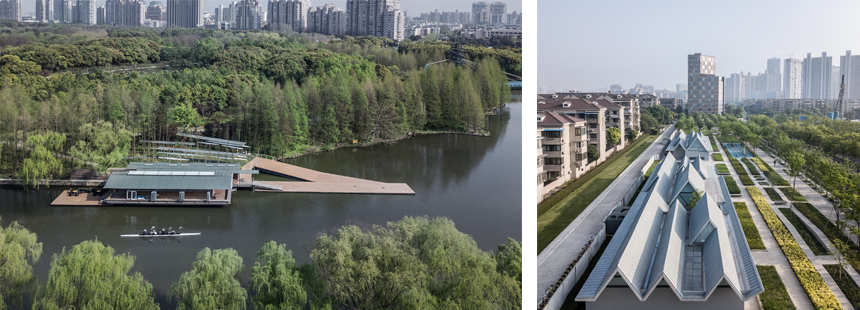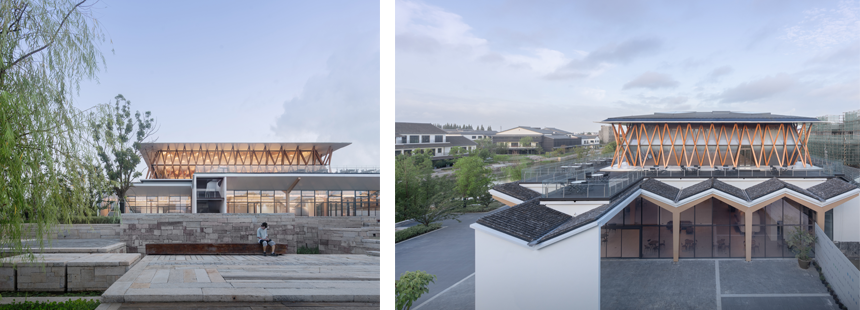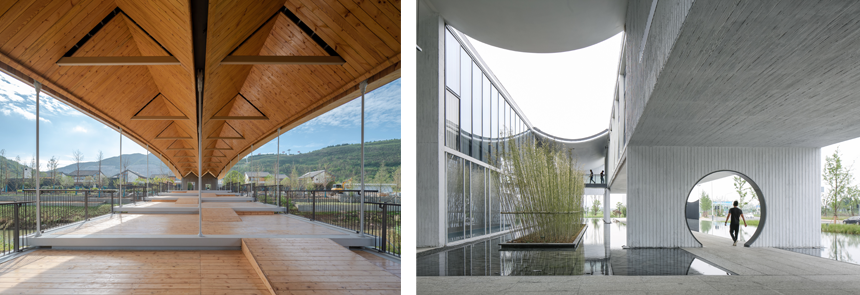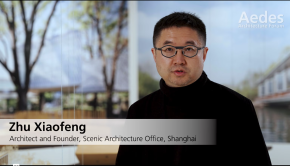Whether a rowing club, kindergarten, art gallery or cultural centre - for almost 20 years, the team of Scenic Architecture Office around founder Zhu Xiaofeng has been planning and realising high-quality cultural buildings with generous public spaces in the form of inner courtyards or vertically layered platforms. In doing so, they combine expressive roof shapes and innovative constructions to create versatile spatial concepts with staggered open levels that create airy as well as shaded places of encounter, even in a subtropical summer climate. This approach unites the nine programmatically very divergent projects in the exhibition. Located in the Shanghai metropolitan area, they create spatial and functional references to the direct surroundings and have thus been able to establish themselves as anchors in their respective neighbourhoods. For the first time in Europe, the Aedes Architecture Forum will provide a comprehensive insight into the way of thinking of Zhu Xiaofeng and Scenic Architecture Office, a conceptual approach that can also be transferred to other regions. Zhu Xiaofeng was already involved in the very successful Aedes exhibition Zài Xīng Tǔ Mù—Fifteen Chinese Architects in 2016.
The exhibition Translated Traditions – Public Courtyards and Urban Platforms shows buildings that have been created in recent years in the Jiangnan region around the city of Shanghai. This metropolitan area is bordered by the Yangtze River in the north, extends to Nanjing in the west, and is characterised by a humid subtropical summer and a cool winter. Scenic Architecture Office specifically considers these climatic conditions, which change greatly throughout the year, by arranging rooms around courtyards or by placing closed rooms above open but covered platforms. This creates lounges and transit spaces that are protected from sun, rain and wind. These aspects of climate-oriented design have been abstracted from traditional models and technically adapted down to the last detail to meet today's requirements and expectations, even on a larger scale.

Deep Dive Rowing Club. © Su Shengliang | Activity Homes at Yunjin Road. © Liang Shan
The architecture usually extends horizontally and integrates into the respective urban or landscape environment. With forward-looking constructions and expressive roof forms, buildings have been created that certainly develop the power to act as anchors in their respective surroundings. The carefully designed transition zones between inside and outside, between architecture and nature, allow a variety of uses and add value that decisively shapes the quality of the urban spaces. For only in this way can the spaces be used by society all year round, despite the weather. With the projects presented in the exhibition, Scenic Architecture Office shows what regionally influenced architecture can look like that draws from tradition and is anchored in contemporary guiding principles with a clear concept.

Shengli Street Neighborhood Committee and Senior Citizens’ Daycare Center. © Jeremy Chen
The exhibition
The exhibition Translated Traditions – Public Courtyards and Urban Platforms, curated by Dr. Eduard Kögel, shows nine selected examples of cultural buildings, sports facilities and neighbourhood centres. The various manifestations of this design principle in the greater Shanghai area are represented by large-scale photographs and models in scales from 1:50 to 1:200, which form the central installation. Zhu Xiaofeng provides further insights into the philosophy and practice of the office in a video. Leporellos provide detailed information on the innovative constructions of the nine cultural buildings.

Xitang Naera Art Gallery. © Liang Shan
The projects
The presented projects are:
Shengli Street Neighborhood Committee and Senior Citizens’ Daycare Center, Shanghai
Pudong Adolescent Activity Center and Civic Art Center, Shanghai
Bilingual Kindergarten Affiliated to East China Normal University, Shanghai
Shanghai Google Creators’ Society Center, Shanghai
Activity Homes at Yunjin Road, Shanghai
Dongyuan Qianxun Community Center, Suzhou
Deep Dive Rowing Club, Shanghai
Xitang Naera Art Gallery, Jiaxing
Bridge of Nine Terraces, Nanjing

Bridge of Nine Terraces. © Zhu Runzi | Dongyuan Qianxun Community Center. © Su Shengliang
About Scenic Architecture Office
Scenic Architecture Office was founded in Shanghai in 2004 by Zhu Xiaofeng. In every project, the office follows a holistic approach that includes not only the needs of the human body and mind, but also those of nature and society. Thus, Scenic Architecture Office seeks to create a balanced and dynamic relationship between these aspects through an architectural approach to create a new identity for contemporary architecture between Chinese tradition and the future. Zhu Xiaofeng received his education at Shenzhen University (Bachelor), Harvard University Graduate School of Design (Master) and Tongji University in Shanghai (PhD). He currently teaches as a guest professor at the College of Architecture and Urban Planning at Tongji University. The office has been involved in many exhibitions in China and around the world. The projects have been widely published internationally and won awards, including Architizer A+ Award, Archdaily Annual China Architecture Award, WA Award for Chinese Architecture and Far Eastern Architectural Design Award. Recently, the office had its first monograph “Rebirth of form-type” published by Images Publishing Group worldwide. In 2016, Scenic Architecture Office was part of the exhibition Zai Xing Tu Mu—Fifteen Chinese Architects at the Aedes Architekturforum in Berlin.

Zhu Xiaofeng | Bilingual Kindergarten Affiliated to East China Normal University. © Su Shengliang
Sponsor
Crownhomes










